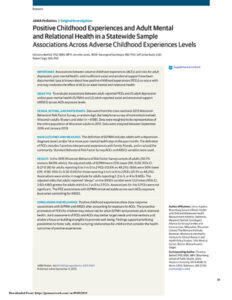Positive childhood experiences protect adult mental health
 Are positive childhood experiences (PCEs) associated with adult depression and/or poor mental health? In 2015, HOPE Director Robert Sege, MD, PhD, Christina Bethell, PhD, MBA, MPH, and others conducted an adult population study in Wisconsin where seven PCEs questions were added to the Wisconsin Behavioral Risk Factor Survey. Respondents reported how often or how much as a child they:
Are positive childhood experiences (PCEs) associated with adult depression and/or poor mental health? In 2015, HOPE Director Robert Sege, MD, PhD, Christina Bethell, PhD, MBA, MPH, and others conducted an adult population study in Wisconsin where seven PCEs questions were added to the Wisconsin Behavioral Risk Factor Survey. Respondents reported how often or how much as a child they:
- Felt able to talk to their family about feelings
- Felt their family stood by them during difficult times
- Enjoyed participating in community traditions
- Felt a sense of belonging in high school
- Felt supported by friends
- Had at least two non-parent adults who took genuine interest in them
- Felt safe and protected by an adult in their home
The authors determined that PCEs buffer adults against the negative lifelong health effects caused by exposure to adverse childhood experiences (ACEs). Each of the seven questions equaled to 1 PCEs score. Respondents with higher PCEs scores were less likely to have mental health problems, including current mental health problems and depression. This relationship between PCE scores and mental health remained true even among adults who were exposed to ACEs.
Publication Information
Authors
Christina Bethell, PhD, MBA, MPH, Jennifer Jones, MSW, Narangerel Gombojav, MD, PhD, Jeff Linkenbach, EdD, Robert Sege, MD, PhD*
*Affiliated with the HOPE National Resource Center
Journal
Publication Date
September 9, 2019
Keywords
positive childhood experiences, PCEs, adult health, mental health, depression, relational health, adverse childhood experiences, ACEs, adult-reported social and emotional support, ARSES, behavioral risk factor surveillance system, BRFS, BRFSS
Citation
Bethell C, Jones J, Gombojav N, Linkenbach J, Sege R. Positive Childhood Experiences and Adult Mental and Relational Health in a Statewide Sample: Associations Across Adverse Childhood Experiences Levels. JAMA Pediatr. 2019;173(11):e193007. doi:10.1001/jamapediatrics.2019.3007




